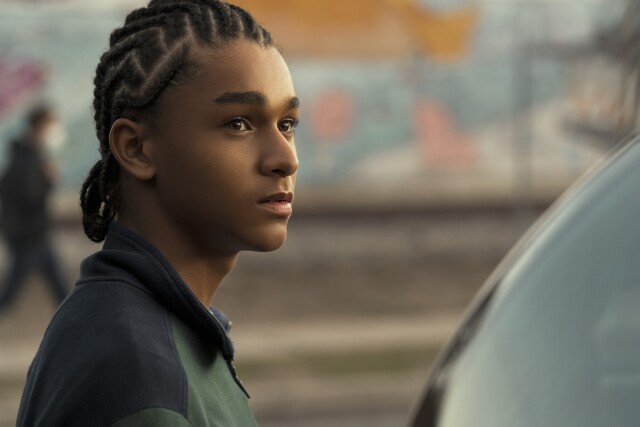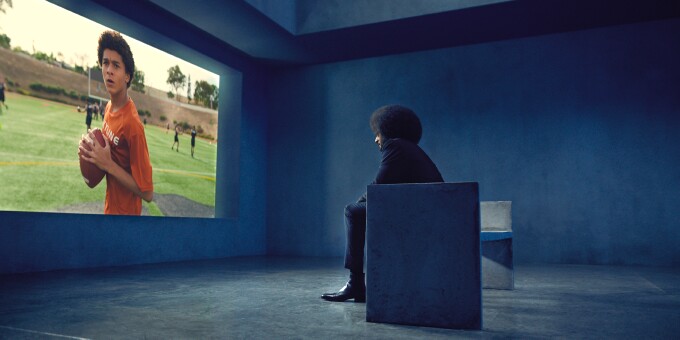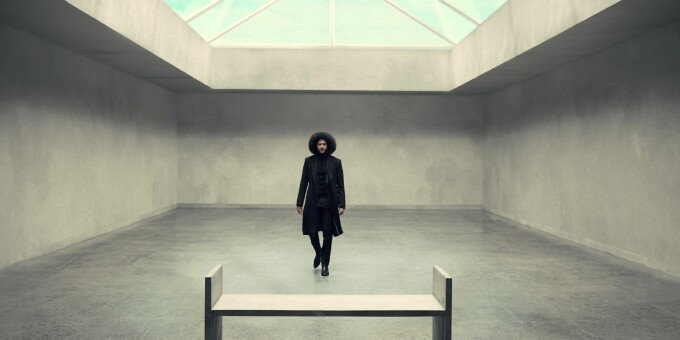"Colin in Black and White" Follows Kaepernick's Journey from NFL Star to Social Justice Hero

"I am not going to stand up to show pride for a country that oppresses Black people and people of color." These words were spoken by none other than American civil rights activist and former NFL quarterback Colin Kaepernick when he addressed the press as to why he'd been refusing to stand during the national anthem at professional football games throughout 2016. "To me,"he said, "this is bigger than football, and it would be selfish on my part to look the other way." These protests against police brutality and social injustice would eventually cost Kap his career in the league, but not before making him an icon for selfless activism. Created by Colin Kaepernick and Ava Duvernay, and starring Jaden Michael (pictured above) and Kaepernick as himself, the Netflix original limited series Colin in Black and Whitegives us all the pleasure and privilege of seeing how this young biracial adoptee growing up in a mostly white California neighborhood became the social justice hero he is today.
Speaking of privilege, it's just one of the many topics covered in this Wonder Years-esque coming-of-age story. The episodes I have seen so far also included topics like cultural identity, acceptance of Black hair, micro aggressions, stereotyping and more, and each is somehow not only woven organically into the premises of their respective episodes, but also highlighted specifically and separately broken down as they would be in the classroom … all without "breaking the episode," so to speak.
The way the series was formatted is actually pretty genius, too. Basically, it exists in two forms: one part is real-life present day Colin Kaepernick narrating and expounding upon the story of his life, not unlike The Wonder Years, but instead of being a disembodied voice one hundred percent of the time, we occasionally see him in this sort of stylized space watching his memories -- the show in its other form -- on a wall-sized screen.

Each episode has a specific theme -- or set of themes. The first one focuses on young Colin's hair journey and how important it was to his identity. Turns out the inspiration for his style of choice at the time was NBA legend Allen Iverson, who had a bigger impact on that league and the culture than I ever would've known without this series. This is when Colin starts to branch into its third (and my favorite) form: documentary.
Within these educational sequences, some of which are just straight up skits, is an abundance of visually appealing animation and collage-style graphics that collectively do the job of emphasizing the information being conveyed while staying true to the voice and tone of the series. This was the format through which I learned about Iverson and the derogatory publicity crusade led against him for how he dressed, which is something about which I was previously unaware.

As far as the Colin soundtrack goes, Netflix as per usual spared no expense.
"This was ten times the budget of a Queen Sugar episode," said Duvernay, referring to her long-running and award-winning drama series on OWN at a recent screening of Colin in Black and White. She was explaining why she made the absolutely stellar choices she did when choosing music for the soundtrack. "Kendrick Lamar is our first cue, I mean … you know? If you're opening on Kendrick Lamar, we're just dropping the mic and saying, ‘This is what we're doing.' It was so fun to play with," she added.
Beyond all that, I just like this show in general. I had my moments -- like when young Colin is left emotionally and culturally alone in the metaphorical wilderness of whiteness that was his actual household and hometown -- where I felt such anger and frustration at the insensitivity and straight up macro-aggression that young Colin had to brave on his way to an adulthood that probably didn't change much as he grew up. I identify not only with some of the situations he was faced with, but also with the era he grew up in, as we're just about the same age. Regardless, those tougher, racism- or ignorance-driven moments were balanced with the lightness that was present-day Kaepernick's wise and refreshing takes on them -- which, again, were even more effective when combined with the full-on educational parts of the program. "Familiar, but fresh," were the words Ms. Duvernay used.
This collaboration by Kaepernick and Duvernay was a great way for the duo to mine the activist's early life for deeper meaning beyond the plotline. Is the first episode really about Colin's cornrows and the obvious lack of Blackness in the lives of his parents (who are played by Nick Offerman and Mary-Louise Parker, by the way)? Or, as Ms. Duvernay put it, "Is it about respectability? Is it about what's acceptable? Is it about social control of Black hair and Black people? Like, what is that about? Let's go deeper.”
Look, I like nothing better in my TV watching than a good "edutainment" moment, and these lessons are important. Kaepernick is a man of purpose, and right now his purpose is to team up with other leaders like Duvernay and affect change by spreading awareness about the social injustices that have plagued our culture since long before any of us were children.
Colin in Black and White is yet another jewel in the crown of quality Black programming, which has been filling up quite nicely of late. I'm here for it -- and you should be, too.
All six episodes of Colin in Black and White are available for streaming on Netflix.
Click the social buttons to share this content with your friends and colleagues.
The opinions and points of view expressed in this content are exclusively the views of the author and/or subject(s) and do not necessarily represent the views of MediaVillage.com/MyersBizNet, Inc. management or associated writers.


